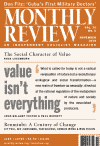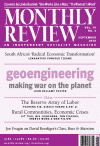Global

A World Turned Upside Down? poses two overarching questions for the new period opened by the Trump election and the continued growth of right-wing nationalisms. Is there an unwinding of neoliberal globalization taking place, or will globalization continue to deepen, but still deny the free cross-border movement of labor? | more…

In many animal-rights circles, Karl Marx and a long tradition of Marxian theorists are to be faulted for their speciesist treatment of nonhuman animals and the human-nonhuman animal relationship. These criticisms typically neglect the larger historical conditions, intellectual influences, and debates out of which Marx’s treatment of the human-animal dialectic arose—even though this is crucial to any meaningful understanding of his thought in this area. In response, this article assesses the historical-intellectual background behind Marx’s arguments on humans and animals, placing it in the context of the influence exercised on his thought by Epicurus, Hermann Samuel Reimarus, Ludwig Feuerbach, Charles Darwin, and others. In the process, they explain how Marx’s view of animals in the world came to be integrated with his theory of metabolic rift and his critique of capitalism. | more…

Rereading Ted Benton and the Economic and Philosophic Manuscripts of 1844
In human-animal studies and critical animal studies, the most influential treatment of animalist Marxism and Marxist animalism has been developed by Ted Benton on the basis of his interpretation of Karl Marx’s work. This article focuses minutely on Benton’s argument and Marx’s Economic and Philosophical Manuscripts of 1844 (or Paris Manuscripts), refuting Benton’s contentions point by point and forcefully challenging the idea that Marx’s work was speciesist in orientation. | more…

In this article from Ever Since Darwin, Stephen Jay Gould describes how the Museum of Natural History’s Gobi Desert expeditions of the 1920s failed to achieve their stated purpose: to find the ancestors of man in Central Asia. In a perceptive analysis of the political role of science and of the social biases that affect thought, Gould describes how anthropologists—despite a complete lack of direct evidence—believed that human evolution was propelled by an enlarging brain, and not, as is the case, upright posture. | more…

The twenty-first century has resulted in a vast upsurge of ecological Marxism and ecosocialism more generally, building on the environmental critique of capitalism embedded in classical historical materialism. At the same time, it has also engendered opposing tendencies and approaches concerning how we understand relentless ecological destruction under capitalism. This issue is dedicated to exploring the theoretical advances, schools of thought, and debates on the left in regard to our world’s ecological crisis, which threatens the survival of humanity and is inescapable within the present capitalist system of production. | more…

The rapid advances in Marxian ecology in the last two decades have given rise to extensive debates within the left, reflecting competing conceptions of theory and practice in an age of planetary ecological and social crisis. One key area of dispute is the attempt by a growing number of radical environmental thinkers to deconstruct the labor theory of value in order to bring everything in existence within a single commodity logic. For many in Green circles, Karl Marx and a long tradition of Marxian theorists are to be faulted for not directly incorporating the expenditure of physical work/energy by extra-human nature into the theory of value. In response, this article argues that any form of analysis that seeks to eliminate the deep-seated dialectical contradictions between the natural form and the value form, as well as between the capitalist economy and the larger socioecological metabolism, fails to comprehend the complex, interdependent dialectics of nature and humanity. | more…

In this excerpt from The Accumulation of Capital, Rosa Luxemburg explains how classical political economy lacks a clear conception of the commodity—both in the terms of the distinctions between use value and exchange value, as well as between concrete and abstract labor. This metaphysical, essentialist framework leads to a complete failure to understand the social character of labor’s capacity to create value. | more…

There is by now no question among informed people that the Earth is undergoing severe climate change—soon to become catastrophic, if humans don’t take drastic measures to stop it. Heroically into the fray steps the biofuel industry, announcing to millions of anxious consumers that this eco-crisis can be averted if only they turn away from fossil fuels, to the saving power of synthetic bioproducts. But, although eliminating fossil fuels is essential, the manufacture of biofuels has far more to do with sating profit-hungry corporations than with saving the Earth. Combining meticulous scientific narrative with devastating economic analysis, The Biofuels Deception argues that the seemingly innovative, hopeful campaign for “green energy” is actually driven by bio-technology industries and global grain-trading corporations. | more…

One of the horrors of the capitalist system is that slave labor, which was central to the formation and growth of capitalism itself, is still fully able to coexist alongside wage labor. But, as Karl Marx pointed out, it is the fact of being paid for one’s work that validates capitalism as a viable socio-economic structure. Beneath this veil of “free commerce”—where workers are paid only for a portion of their workday, and buyers and sellers in the marketplace face each other as “equals”—lies a foundation of immense inequality. Yet workers have always rebelled. They’ve organized unions, struck, picketed, boycotted, formed political organizations and parties—sometimes they have actually won and improved their lives. In his timely and innovative book, Michael D. Yates asks if the working class can, indeed, change the world. | more…

In the last piece he wrote before his passing, Samir Amin revisits, for our age, the most important revolutionary document of all time, the Communist Manifesto. In a fitting conclusion to the work of a great revolutionary intellectual, Amin seeks nothing less than to explain the changing world trajectory from 1848 to 2018. Against the persistent vision of the globalized development of capitalism, he puts forward a vision for the transformation of the world through revolutionary processes—breaking with the submission to the deadly vicissitudes of the decadence of civilization.

In this excerpt from his forthcoming title, Can the Working Class Change the World?, Yates details the historical development of the working class—its potential for (and barriers to) unity, and how it is still the only force in society that can bring about its fundamental, radical transformation. | more…

Founded in the late 1960s and recently revived, the radical organization Science for the People did—and does—far more than just publish a magazine. Chapters are forming around the country, including physicists, engineers, and biologists, as well as representatives of other scientific groupings and social movements. We at MR welcome the return of this great publication and movement of the U.S. left. | more…











